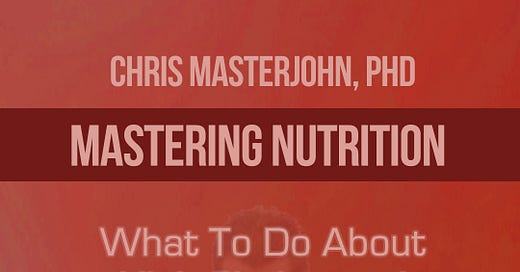Introduction
If you’re concerned about your cholesterol, or confused about what to do, this episode is for you. In this episode, I list the four key factors that control blood cholesterol levels and outline the simplest dietary or lifestyle changes we can make to have the biggest impact.
Show Notes
In this episode, you will find all of the following and more:
0:00:33 Cliff notes
0:06:11 Targeting the low-hanging fruit
0:08:32 The total-to-HDL-C ratio as a fingerprint of low LDL receptor activity
0:10:08 Other markers such as particle size, particle count, and ApoB as fingerprints of low LDL receptor activity
0:13:19 The four factors that control the LDL receptor
0:15:36 Intracellular free cholesterol (effects of dietary fiber, cholestyramine, statins, and polyunsaturated fatty acids or PUFAs)
0:17:26 Thyroid hormone (effects of micronutrients, body fat, and carbohydrate intake)
0:20:38 Insulin (via PCSK9, effects of the fasting-feeding cycle and carbohydrate intake)
0:23:48 Inflammation (via PCSK9, effects of acute infection and chronic inflammation)
0:26:01 Practical approaches to maximizing LDL receptor activity
0:26:12 Nutrient-dense whole food diets
0:30:48 Thyroid disorder
0:34:02 Adrenal stress, circadian stress, inflammatory stress
0:35:54 Insulin resistance, body composition, and fatty liver disease
0:38:38 Weight loss will improve insulin sensitivity, and for many a low-carb diet is a tool to achieve that, but in an insulin-sensitive person, carbohydrate stimulation of insulin has a powerful beneficial effect on LDL receptor activity
0:43:07 Inflammation and PCSK9
0:43:48 C-Reactive Protein levels, body composition, diet quality, and exercise
0:46:10 Replacing fat with carbohydrate
Posts Related to “What to Do About High Cholesterol”
014: Dietary Management of Heterozygous Familial Hypercholesterolemia (HeFH) provides a more detailed background on the LDL metabolism in general but especially the regulation of PCSK9 by insulin and inflammation. The principles can be very easily adapted to managing blood lipids in someone who does not have this disease.
Lesson 12 covers the role of LDL oxidation in heart disease. Lesson 13 critically analyzes the evidence that replacing saturated fats with polyunsaturated fats prevents heart disease. Lesson 9 covers fatty liver disease.
For more on fatty liver disease, see Start Here for Fatty Liver Disease.
Episode 11 on how body fat and carbohydrate intake influence thyroid hormones.
Episode 20 on what causes insulin resistance at the cellular level.
Episode 21 on what causes insulin resistance at the systemic level.
Oldie but goodie: The Total-to-HDL-Cholesterol Ratio — What Does It Mean?
My three-part interview with Chris Kresser on blood lipids: part 1, part 2, part 3.
Read the Transcript or Leave a Comment
Masterpass members have access to the transcript below.
Masterpass members can also read and leave comments below. Non-members can read and leave comments on the general podcast page.
Learn more about the Masterpass here.



